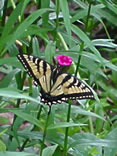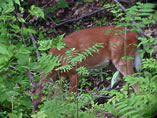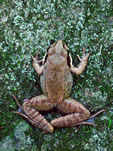
Nature Journal
| |
|
| Sunday, July 20, 2003 | |
|
I heard
the young barred owls again last
night at dusk, so I went outside to see if they were nearby. |
|
| Saturday, July 19, 2003 | |
| Last
night after dark, I heard the screeching sounds of two young barred
owls. After the young owlets leave the nest, they continue to
be fed by their parents. And they use this screeching sound to let
the adult birds know when they're hungry - which seems to be most
of the night! I went outside so I could hear the owlets better and try to guess where they were located. Surprisingly, each one was in a separate tree. Last year, there were barred owls nesting nearby, but the begging sounds came from only one location. When they leave the nest, young barred owls usually just clamber onto a nearby limb. They don't fly until up to six weeks later. Maybe these two little owls are at the stage where they can fly - but are still dependent upon their parents for food. |
|
| Thursday, July 17, 2003 | |
 The
Eastern Tiger Swallowtails
are still flying. Spotted this one sipping nectar from a Wild Sweet
William flower. The
Eastern Tiger Swallowtails
are still flying. Spotted this one sipping nectar from a Wild Sweet
William flower.This butterfly also feeds on the nectar of the Joe-Pye Weed, Common Milkweed, and many other flowering plants and trees. It can be found in open woodlands and fields. |
|
| Tuesday, July 15, 2003 | |
| Yesterday,
I noticed a chestnut-sided warbler
singing while it was sitting in a small maple sapling. This bird would
sing for a little while, stop, and then move further up the tree.
It continued this until it reached the top of the tree. The chestnut-sided warbler builds its nest only a few feet off the ground - usually in dense shrubs, brambles, or saplings. I think the warbler I saw might have a nest somewhere near the house. But I hesitate to look for it - not wanting to disturb this bird during its nesting period. |
|
| Sunday, July 13, 2003 | |
 Saw
this whitetail buck near the house yesterday. The sumac saplings and
other vegetation do a good job of hiding this deer - even though it's
browsing in a fairly open area. Saw
this whitetail buck near the house yesterday. The sumac saplings and
other vegetation do a good job of hiding this deer - even though it's
browsing in a fairly open area. I rarely see bucks near the house or |
|
antlers are growing - one is about 4 inches long and the other is only about 1 inch long. |
|
| Friday, July 11, 2003 | |
| Today,
for the first time this year, I saw the tracks of a whitetail
fawn. The doe's tracks were right nearby. After her fawn (or fawns) are born, the doe will spend a few hours at the birth site while she cleans the fawns, nurses them, and removes everything that might contain their scent from the birthing area. She then moves them to separate bedding areas. The doe visits each fawn only two or three times a day to nurse it and groom it. She then moves the fawn to a new bedding area. This helps protect the fawn from predators. The doe will usually remain within a few hundred feet of her bedded fawns - watching for any signs of danger. |
|
| Wednesday, July 9, 2003 | |
|
|
|
|
The wood frog's diet consists of insects, snails, worms, slugs, and other small invertebrates. |
|
| Monday, July 7, 2003 | |
| The
Great Spangled
Fritillaries and the Cabbage White
butterflies are flying. There are still some White
Admirals around but not nearly as many as there were a couple
of weeks ago. Saw a group of wild turkeys yesterday - about 4 or 5 males. They were foraging under some hemlock trees. It was probably the same group that I saw about ten days ago. Also, the woodchucks have been more active lately. It seems to happen around this time of year. I would guess that the young woodchucks have been weaned by now. But I haven't seen any sign of them. |
|
| Top of page |
|
|
| Birds | Butterflies | Mammals |
| Garden Shop |
New England:
Connecticut, Maine, Massachusetts, New Hampshire, Rhode Island, Vermont
